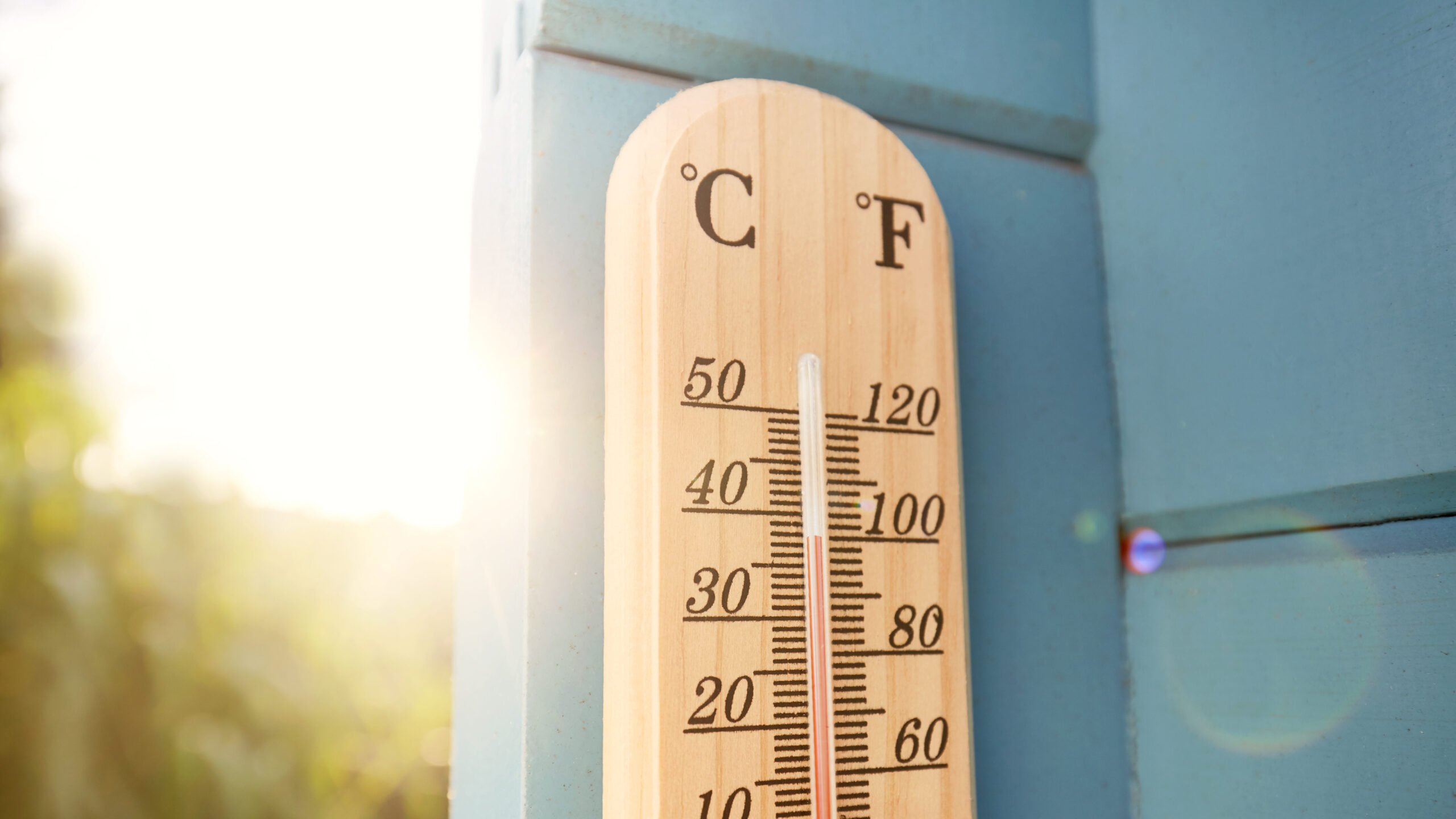Hot weather and heatwaves

Although many people enjoy warmer, summer weather, anyone can become unwell if they get too hot. People can become unwell through overheating, dehydration, heat exhaustion and heatstroke. Hot weather can also place strains on water and energy networks, road and rail transport, and health and fire services. This can result in power cuts, restriction or loss of water supplies, and disruption to transport. For example, the UK experienced a brief but unprecedented extreme heatwave in July 2022, when temperatures in parts of England exceeded 40℃ for the first time.
Who is most at risk?
Hot weather can affect anyone, but some people face a higher risk of being impacted by heat. Some of the groups who may be most at risk are:
- Older adults.
- Babies and young children.
- Pregnant people.
- People with underlying health conditions (particularly heart and breathing problems).
- People who are physically active and spend a lot of time outdoors (e.g., runners, cyclists, manual labour jobs).
- People experiencing homelessness.
- People who live alone and may be unable to care for themselves.
- Those who live in top floor flats, or homes with restricted or limited windows.
Actions to take to prepare for hot weather and heatwaves
- Those who are likely to be at greater risk should take extra care to protect themselves before periods of hot weather. If you know anyone who might be at greater risk you can ensure that they are aware of the actions they need to take to keep themselves safe, and offer practical help if appropriate (e.g. helping them to stock up on water or medication).
- Read about the symptoms of heat exhaustion and heatstroke and understand the actions to take if you or someone else has them. Heat exhaustion does not usually need emergency medical help if you can cool down within 30 minutes. If it turns into heatstroke, it needs to be treated as an emergency.
- If you live in a home that is more likely to overheat (e.g., a top floor flat or homes with restricted opening of windows), contact your local council, your letting agency or Citizen’s Advice to find out what help and support they can provide.
- Consider any modifications you could make to your home to keep it cool, such as installing external shutters or awnings, internal blinds, or growing plants outside to shade south facing windows.
- If a period of hot weather is forecast, prepare your vehicle for hot weather by checking your tyres, fluid levels, battery and air conditioning, and pack water bottles in your car boot in case of a breakdown. Guidance is available from the RAC.
Actions you can take during a spell of hot weather or when one is forecast
- Check the weather forecasts and warnings, or download the Met Office Weather Forecast app where you can create alerts for your area. Pay particular attention to any National Severe Weather Warnings or Heat Health Alerts covering your area, and act on any advice issued.
- Check your heating is turned off and check that your fridges, freezers and fans are working properly.
- Ensure that family, friends and neighbours who may be at higher risk of becoming unwell are aware of, and following, actions to keep themselves safe. If you are worried about someone else’s health, contact your local pharmacist, your GP or NHS 111, who will all be able to offer advice and support.
- Drink plenty of fluids. If you are going out, take a refillable bottle filled with water.
- Keep out of the sun as much as possible at the hottest time of the day (between 11am and 3pm).
- Wear lightweight loose-fitting light-coloured clothes, and if you go outside, seek shade, apply suncream, and cover up with appropriate clothing (e.g. sunglasses and a wide-brimmed hat).
- Apply sunscreen generously and re-apply frequently, especially after activities that remove it, such as swimming or towelling. The NHS website has advice on sunscreen and sun safety.
- Schedule physical activities (e.g., exercise, walking the dog) for times of the day when it is cooler, such as the morning or evening.
- Keep your home cool by shading and closing windows and curtains, especially in rooms that face the sun, and opening windows when the air feels cooler (e.g., at night).
- During hot weather, it may be cooler outside (in the shade) or in a public building (such as places of worship, local libraries, or supermarkets): visiting these places may be an alternative way of cooling down if you are able to safely travel there without putting yourself at risk from the heat.
- Small, closed spaces such as stationary cars can get dangerously hot very quickly. Make sure that babies, children, older adults and pets are not left alone in stationary cars or other closed spaces. Take extra water for journeys on public transport or by car.
- Allow extra time for journeys: road surfaces can be damaged by heat, and hot weather can mean speed restrictions are introduced on rail lines (resulting in delays and/or cancellations). Check advice issued by transport operators ahead of time, and follow ‘Do Not Travel’ warnings.
- If you go swimming (either in a public pool or open water), read advice on safe summer swimming from the Royal Life Saving Society.
Further information and resources
Read information on how to stay safe and keep your home cool during hot weather.
The Met Office provides guidance on hot weather and its impacts, including how to keep your pets safe and for regularly updated seasonal advice visit WeatherReady.
Read advice from the NHS about how to cope in a heatwave.
Public Health Wales has published guidance on how to enjoy summer safely and how to manage in extreme hot weather. Read advice on staying safe in hot weather in Scotland.